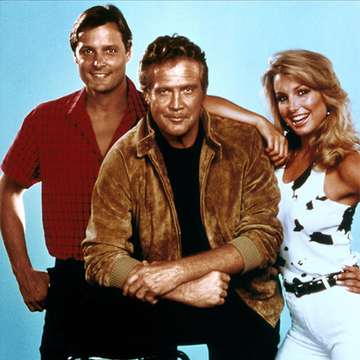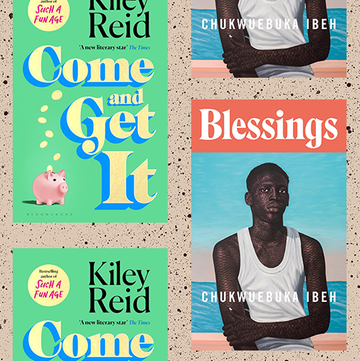"Excuse me," says Dominic West, "I’m just going to wipe this so you can sit down and you won’t be infected with disease." About seven crumbs on his otherwise clean kitchen table disappear with the swipe of a tea towel, and he gets back to the business of making lunch. We’re in the kitchen of his house in Wiltshire, where he lives with his wife Catherine and their four children.
His head turns from cupboard to cupboard, like he’s watching a tennis match. “Where has the rice gone? Would you like rice?”
Yes please, if that’s what you’re having.
“I am, if I can fucking find it.”
He fucking finds it and a pan of rice goes on the hob next to the pan of leftover beef stew. “So I’m on the cover?” he says, looking out of the window. “But doesn’t that mean you’ve got to try and make it interesting?”
In 2000, Dominic West joined an Argentinian circus. This was the year before he auditioned for and won his breakthrough role of Detective Jimmy McNulty on The Wire and the year after he had a single line (“The boy’s here to see Padmé”) as a guard of one of those science-fiction sliding doors in Star Wars: Episode I — The Phantom Menace. He was 30, five years out of drama school and father to a one-year-old daughter.
The circus, De La Guarda, had a show, also called De La Guarda, at the Roundhouse in Camden. It was the hottest ticket in London that year. The audience entered the round to ambient music under a low paper ceiling. Performers would burst through the paper, on ropes, and eventually a pounding live soundtrack accompanied a dozen or more roped performers as they ran around the walls of the circular venue. Water rained down. Some audience members would be lifted into the air; others, perhaps more fortunate, would be pressed into urgent dancing with attractive, adrenalised Argentinians unclipped from their shackles. Or indeed, West himself.
“Why did I do it?” says West, somewhat incredulously. “You saw it! Wouldn’t you want to run away and join that circus? It was such a sexy show. I saw it in London and New York, then heard they were auditioning in London and I had to do it. I did a lot of shows in five months with those amazing men and women, then they went to Vegas. It was a disaster there. The water. People dressed up for a Vegas show — of course they didn’t want to get wet.”
West didn’t want to go to Vegas. But he would end up spending a lot more time in America, filming five seasons of The Wire and four seasons of The Affair, with a fifth and final one due to start filming a couple of days after we make lunch.
“The toughest part of making these big episodic American television shows is missing my family and the boredom,” he says, gearing himself up for the process to begin again. “Sitting around waiting and not being bored is hard. There was a time when I had a play in the West End [Butley, 2011] and was learning Iago [for Othello] and I had more on than usual. That was hard work, but the harder that aspect of the work gets, the more enjoyable it is. Actual graft is what’s great about acting. That’s something I relish, because most of the time, it’s about coping with tedium.”
To stop himself being bored on set, West likes to have fun. “You can’t not have fun with him,” says Keira Knightley, soon to be seen alongside West in the film Colette. “I think fun is something that Dominic brings to everything. He very much likes a night out, is always up for a laugh and is, in the best way, wicked. And he is a phenomenally good actor, he really is. So effortless.”
“For a lot of us,” Knightley says, “who do actually need to concentrate when we’re working, it’s, ‘How are you that good when you're chatting and joking until the very last second?’ Even I had to tell him to shut up so I could concentrate. Which I had to do quite a lot.”
West is not about to shut up. And he’s not the only one. “I just did a thing with Olivia Colman [a BBC mini-series adaptation of Les Misérables] and: fuck me! Ha ha ha! The whole thing is like playing top-level sports with her. How frivolous can you be up to ‘Action!’ and then be amazing. She doesn’t do that consciously, she is just really fucking good. She is way, way, way better than me. I had to stop listening to her because she is so funny.”
Then a more serious thought occurs. “Malcolm Gladwell’s thing about 10,000 hours [the writer’s theory, from his book Outliers, that to be expert in any field requires that exact amount of practice time]? I worked it out and I’ve had at least 20,000 hours. I’ve acted so much now I can turn it on and off, and that’s maybe where the humour thing comes in. I have had an awful lot of practice at this.”
Dominic West first got the taste for drama when he was nine years old. His mother, Moya, gave him a part in her amateur production of The Winslow Boy, at Sheffield University’s drama studio. His father, George, had a factory in Wakefield that made vandal-proof bus shelters. George’s father, Harold, a managing director of a steelworks in Barnsley, fought in WWI and was wounded at the Battle of Vimy Ridge. “After, he wrote a note to go with his medals,” says West, “that said, ‘Here are a few mementos from a deeply happy part of my life’.” West has found documentaries commemorating the centenary of the Armistice “deeply moving.”
He is the sixth of seven children, with five sisters and an elder brother. They grew up in a large house on the edge of the Peak District, about 10 miles southwest of Sheffield. He boarded at Eton and hated it to begin with. “I was very homesick, had no reference to it, didn’t know anyone who had gone and I felt I was in the wrong place.” Inspiring teachers and school plays gave him something to be excited about and set him on his path.
“It’s pretentious to say, really, but my acting education was defined by doing Hamlet at Eton, reading Ulysses when I was doing my English degree at Trinity College in Dublin, then War and Peace, which we put on at Guildhall [School of Music & Drama in London]. That’s it, really. All I learned anywhere.”
Legend has it that in the audience watching his Prince of Denmark was Damian Lewis, a couple of years behind West at school, and later the star of Band of Brothers, Homeland and Billions. So taken was the younger lad by what he saw that he decided to become an actor.
“Categorically: no,” Lewis tells me, over the phone from Los Angeles. “I had always acted at school and always enjoyed it. Me thinking it was something I could do more seriously didn’t happen until I was 16 years old, after seeing Dom do Hamlet. He was very charismatic. A big, booming sonorous voice, especially for a 17-year-old. I was very taken with him, he was very captivating up on stage.”
Since graduating from Guildhall, West has worked solidly. He is not a huge movie star but is highly successful and versatile. There aren’t many men who could convincingly play both Fred West and Richard Burton, as West has done. He won a Bafta for his Fred West. He’s most memorable as Jimmy McNulty, not least because he and The Wire are so good, but also because constant reminders of those two facts have become standard reference points in the increasingly vast conversation about the New Golden Age of TV.
He has, in his own words, played “a long line of philandering cads”, from McNulty on to Hector Madden, the Fifties news anchor in two seasons of The Hour for the BBC, to Noah in The Affair and Willy in Colette. “What’s amazing,” says Keira Knightley, “is that he can play characters that should be total dickheads, yet he manages to give them a point of view and his own incredible charm, so you sort of forgive them for how terrible they might be. It is a great skill.”
But he is far from typecast. His five film roles previous to Willy in Colette are: Lara Croft’s dad, a sort of country-gent Indiana Jones, in Tomb Raider; a quietly pompous pyjamas-wearing modern artist in the Swedish film The Square, which won the Palme D’Or at the 2017 Cannes Film Festival; Rudder, a comic-relief Cockney sea lion in Pixar’s Finding Dory; a Teflon swine of a CEO opposite George Clooney and Julia Roberts in Money Monster; and, in Genius, Ernest Hemingway.
There have been stage successes, including star turns in the West End. Following up the blockbuster and critically lauded play Jerusalem, the writer Jez Butterworth and director Ian Rickson could have done any play with anyone on any stage. They chose Dominic West to star in The River, a short, intense play with one man and two women in the 90-seater upstairs room at the Royal Court Theatre in London, for which West won universal praise.
“Dominic is able to unleash his unconscious in a really ‘present’ way,” says Ian Rickson. “It allows him to fuse into the darkness of Fred West, for example, or the troubled soul of McNulty. In terms of archetypes, he has a trickster quality hiding a warrior/lover inside. That’s exciting. There’s very little ego and a lot of generosity of spirit. He actually has a refreshingly comic sense of himself, so he does really value the opportunities he has, and doesn’t take them too seriously.”
West feels he does and he doesn’t. “I suppose deep down there’s a feeling that what I do isn’t desperately serious. It might have been Mark Boxer, the cartoonist, who said he went to some lunch for cartoonists, an awards maybe, and he was having a piss and the guy next to him said, ‘Cartoonist. It’s not a real job, is it?’ And he said, ‘No, it’s not. Isn’t that great!’ He took great comfort from that and I feel the same about acting. But there is something in me which feels, partly because I have been doing it all my life and did as a hobby before I did it professionally, that this is not a serious job for adults.”
Perhaps this is why he’s so self-deprecating. Twice during our conversations, he says that he’s not a “real actor”, bringing up Daniel Day-Lewis’s commitment to doing an accent the entire time he makes a film, on and off set, and his own inability to match that; and pointing out Robert De Niro’s weight gain for Raging Bull. For Colette, West wore a fat suit.
And yet, during our conversations, he trots out seven perfect accents and imitations: Mick Jagger, the German film director Werner Herzog, Northern Irish, Irish, Australian, New York and a deep, thespian-type voice to convey mock indignance. He’s not showing off. Some of the voices were to make anecdotes funnier and others were just as anyone might do an accent subconsciously when you think of someone with an accent. You know, for fun.
But he can be serious. “It is a bad thing, to be self-deprecating,” he says, a little bit disappointed with himself. “Maybe it’s an educational thing. It’s quite an English thing, which you become very aware of in America. People just don’t understand why on earth you would do that. There are enough people who would do you down, why do yourself down? I sort of agree with it, now. It is tiresome.”
Clarke Peters, who played Lester Freamon in The Wire, and Othello to West’s Iago on stage in 2011, has a different view of his friend’s dilemma. “As good an actor as he is, his self- deprecating comments are his truth. He would prefer to be playing than talking about himself; exploring a character, discovering nuances, dissecting a character’s arc, is where he’s comfortable. Presenting all that unseen work is nerve-wracking. And actors are never the best judges of their own work. So, to be safe from criticism and microscopic scrutiny, self-deprecation is the best defence."
The fat suit in Colette was no cop-out. “I was then about to play Jean Valjean,” West says, more forgiving of himself now, “a man who has been in prison for 19 years, so there was a clash of waistline imperatives.” He plays the lead in a song-free, six-part Les Misérables — the project in which Olivia Colman out-joked him — the BBC’s first big drama of 2019, with the opening episode broadcast on New Year’s Day.
According to Keira Knightley, the extra padding, and a walrus moustache, did not mute West’s physical attractiveness. “Nobody looks good in that,” she says, “but he somehow manages to be dangerously sexy through it. It was a main conversation between the rest of us on set: how he managed to ooze sexuality while he was farting in two fat suits. Quite extraordinary. I can’t think of another actor who might be able to do that.”
Sarah Treem, the showrunner of The Affair, could not conceive of anyone else but West as her leading man, Noah Solloway. “He didn’t audition. I wrote it with him in mind,” she says. “I was a huge fan of The Wire and I just loved how complicated he could be — both likeable and unlikeable at the same time.”
The Affair begins with Noah, a married father of four, embarking on a fling with a waitress, Alison, played by Ruth Wilson, and then follows the fall-out for the two of them, their spouses and extended families. West, Wilson and the wider cast are terrific, as is the show’s central conceit of telling the story from the point-of-view of different characters, usually two in each hour-long episode.
“Dominic is so good at playing all different facets of Noah,” Treem continues. “His intelligence, his lust, his insecurity, the pain of his childhood, his love for his children. He lets Noah be a very complicated, sometimes deeply generous, sometimes horribly selfish, man.”
West concurs, with a caveat. “I have had difficulty wondering why someone who I can identify with — he’s my age and has a bunch of kids — would do the things he does. Sarah, a very brilliant woman younger than I am, looked at me with a raised eyebrow when I said, ‘Men my age just don’t do that. Why leave your wife and kids for a waitress and start another family?’ She told me the stories of several real people who had. Not that I want my characters to be sympathetic, but I want to give them the benefit of the doubt and I have struggled with Noah in that regard.”
West has five children: a daughter, 20, with former girlfriend Polly Astor, and two sons and two daughters aged 12, 10, nine and five, with his wife, the landscape designer Catherine FitzGerald. It is Catherine’s beef stew we have been eating for lunch, their children’s clothes drying on the Aga behind us. On a smaller table in a nook in the corner of the kitchen, next to some half-completed maths homework, is a pile of dad’s hardbacks: The Flame by Leonard Cohen, William Dalrymple’s retelling of the Indian mutiny of 1857, The Last Mughal, and Changing Stages, Richard Eyre and Nicholas Wright’s history of 20th-century theatre.
Out in the driveway, a small child’s BMX has been discarded in front of mum’s Audi A3, in perfect position to be crunched into the gravel next time the car sets off. At lunch, West didn’t know where the rice was because he and his family have only lived in this house, a former brewery in a Wiltshire hamlet, for a few weeks. They used to live in Shepherd’s Bush, in a house that once belonged to another actor from Sheffield, Brian Glover.
“I have led my family out of London slightly against their will,” West admits, “and quite legitimately want my children to be around plants and animals more than they perhaps might be in London. My wife said I’m trying to create my childhood home here and I said, [now, the thespian accent] ‘No I’m not! Preposterous! What do you mean? It’s nothing like that!’”
His wife’s childhood home is Glin Castle in County Limerick, Ireland, a true country pile (15 ensuite bedrooms, 380 acres, secret bookcase doors) that, in various versions, has been in her family for nearly 800 years. (It’s the house you can see in the background of the photographs on these pages.) She and West want to hold on to it. To do so, the house needs to become a going concern as an events and private hire venue to cover its annual £130,000 running costs.
“I do like history and I do like old buildings,” West says. “I’m also conscious of my wife’s father and his and her legacies. He worked in conservation in Ireland, to try and preserve these old buildings, which were out of favour for many years. It’s up to us to try and keep that going, because when they’re bought by hotels and the like, they’re often destroyed.”
This Christmas and New Year, he says, “we have a super-A-list celebrity taking it. Who, I can’t possibly divulge. Actually, can you do us a big favour and put the website, please, at the end of the piece? ‘Glin dash castle dot com.’ It would make my life easier.”
It’s time to do the school pick-up. “We can keep talking in the car,” he says, and leads the way to a silver Chrysler Grand Voyager. “It has,” West says, buckling up, “the biggest capacity of any people carrier.”
Precisely something a turning-50-next-year dad-of-five should say. “I have no problem getting older,” he says. “For male actors of my age there is less emphasis, and I have already started to play the dad of the lover instead of the lover. The pressure is off. Some swami said that the key to happiness is ‘I don’t mind what happens.’ You mind less about things, let go of them. Turning 50 is great. My daughter is also turning 21, so we should have quite a party.”
He has regrets. “I suppose I wish I had played more Shakespearean roles.”
What about the old-man ones? “Only Lear is as good as the young ones.”
What about not being James Bond? “Fuck no! I’m delighted now that I didn’t get it.”
Auditioning for Bond, in 2005, West turned up in a T-shirt and tatty jeans. “I remember the director, Martin Campbell, saying, ‘Thank Christ you haven’t turned up in a tux like everybody else’. It was for Casino Royale. At the time, I really wanted to get it. I love Bond, and I was the right age for it. They asked me, ‘What do you think should happen with Bond?’ And I said something deeply uninspired like, ‘I think he should go back to being more like Sean Connery’. I thought then that it was the best job you can do. Now, I’m not so sure. You have a year-and-a-half of hell doing publicity.”
West pulls up opposite the school. “Wait here. Enjoy the smell. Kids’ banana skins,” he says, opening the driver’s door. Puzzled, I sniff the air. There is no unpleasant aroma. The interior of Dominic West’s car smells perfectly fine. But, of course, he claims otherwise. He’s a terrific actor and a thoroughly likeable chap, but that self-deprecation still needs some work.
Colette is in cinemas on 11 January; glin-castle.com















